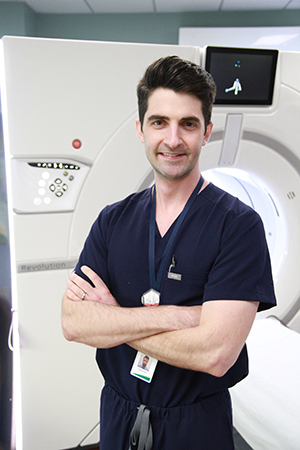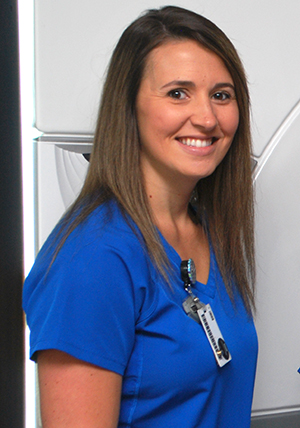What is a calcium scoring test and do I need one?
Heart Health
This non-invasive, low-cost screening is offered at St. Joseph’s Hospital and the Pooler and Bluffton imaging centers
Preventative screenings can be a life saver. Mammograms can detect breast cancer. Colonoscopies look for polyps that may be cancerous.
As for your heart, there’s a preventative screening that you may be interested in that can reduce the risk for having a heart attack. It’s called a calcium scoring test.
Calcium scoring is a non-invasive imaging test used to evaluate someone’s risk for having a heart attack, explains Dr. Daniel O’Mara, a radiologist with Savannah Chatham Imaging.

“This test allows us to measure the quantity of calcium in the coronary arteries, which is an indicator of atherosclerotic heart disease,” Dr. O’Mara says. “Higher amounts of calcium in the coronary arteries indicate a higher risk for heart attack.”
Atherosclerotic heart disease is a buildup of fat, cholesterol, calcium and other substances in the walls of the arteries, which can restrict blood flow to the heart. If plaque continues to grow, it can lead to heart blockages or heart failure, explains St. Joseph’s/Candler Physician Network Cardiologist Dr. Michael Babcock. If this plaque suddenly becomes unstable, a heart attack can occur, he says, which can be debilitating or life threatening.
One way to detect calcium buildup early is through a CT calcium scoring test. These screenings are performed routinely at St. Joseph’s Hospital Imaging Center and our Bluffton and Pooler Outpatient Imaging Centers.
“This non-invasive, low-cost tool is an excellent screening method for the presence of plaque,” Dr. Babcock says. “The buildup of plaque should lead us to become more vigilant about our health.”
Who needs a calcium scoring test?
Dr. Babcock recommends this screening for patients who have an intermediate risk for coronary artery disease. This can include:
- People with diabetes
- Those with high blood pressure or high cholesterol
- Smokers
- People with a family history of heart conditions
Calcium scoring may not be suited for everyone. This test may not significantly benefit people who have already had a heart attack or have had procedures to fix blockages of the coronary arteries. 
Additionally, because this test uses radiation, women who are pregnant should not undergo this screening, says Dr. O’Mara.
How is the test performed?
Calcium scoring is an imaging, non-invasive procedure done through a CT scan. CT stands for Computed Tomography.
Related Article: What to expect during a CT scan
The CT scan creates images that allow radiologists to see the coronary arteries, which are the long vessels coursing along the heart, says Dr. O’Mara.
“Normally, the arteries are a uniform shade of gray,” he says. “Calcium appears as bright white spots in the coronary arteries.”
A radiologist will look for the presence of those bright white spots, or calcium, and report his or her findings to the referring patient’s cardiologist.
What do the results mean?
“A calcium score can provide important information of your 10-year risk of having a heart attack,” Dr. Babcock says. “Knowing this risk can lead to more intensive medication changes or, more importantly, dramatic lifestyle changes to prevent an event.”
This may include changes to your diet and exercise routine, and if you are a smoker, stop smoking. Cholesterol medication also may be recommended. High-intensity cholesterol medications have been shown to not only prevent continued plaque buildup, but can actually stabilize existing plaque, Dr. Babcock says.
Related Article: What is cholesterol?
Additionally, if a large amount of calcium is present, this may indicate the need for further investigation of the arteries with stress testing or through coronary angiography, which are procedures that look at how blood is flowing through the arteries.
Your cardiologist will determine the best treatment options for you.
What should I expect if I have a calcium scoring screening?

In total, the imaging process should not take more than 30 minutes, says Marsha Cobb, technologist at St. Joseph’s Hospital. Upon arrival, you will register and then be called back to a CT room. Electrodes will be placed on your chest to monitor your heart during the screening.
Contrast – an agent that improves the visibility of the anatomy for clearer images – is not used during this screening. Nor is an IV needed, Cobb says.
You will lie down on the CT bed, which moves back and forth as the machine takes images of your heart. The scan itself takes only about two minutes.
“It’s a quick and simple test,” Cobb says. “The machine is pretty big and open so you are not confined. You are sliding back and forth so you are not under there the entire time, which is good for those who are claustrophobic. In fact, the majority of patients who are claustrophobic do not have issues with this machine.”
Patients who have this screening are allowed to drive home and return to normal activity immediately after completing the test, Dr. O’Mara adds.
Some insurance companies will cover all or some of the cost of this screening. However, if your insurance company doesn’t, or you just wish to have this screening, St. Joseph’s/Candler offers this self-paid procedure for just $100.
A physician’s order is required for calcium scoring. Talk to your primary care doctor or cardiologist to see if you are a candidate.